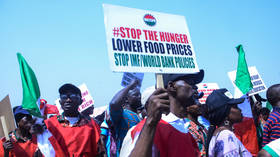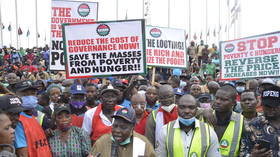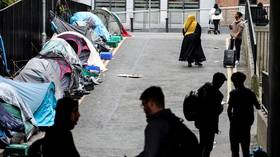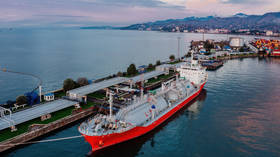Nigerian unions protest IMF and World Bank dependency (VIDEO)

Nigerian government workers and several other groups, including traders and students, staged nationwide protests on Tuesday, demanding that the government address the country’s escalating economic crisis.
The National Labor Congress (NLC), which organized the demonstrations, has asked authorities to stop borrowing from the International Monetary Fund (IMF) and the World Bank, claiming that such policies are exacerbating the West African nation’s economic woes.
“We are hungry. There is hunger in the land. There’s nobody that doesn’t know this. You can’t buy anything. Bread is out of reach,” NLC president Joe Ajaero told reporters during the protest in the capital, Abuja.
Living and transport costs in Nigeria have risen since President Bola Tinubu, who took office on May 29, ended a fuel subsidy as part of reforms aimed at cutting the budget deficit. The devaluation of the local currency – the naira – has increased the cost of goods.
Congress President, Comrade Joe Ajaero, leads on the front line . #EndHardshipNow! #EndHungerNow! pic.twitter.com/BjenSpwB8K
— Nigeria Labour Congress HQ (@NLCHeadquarters) February 27, 2024
According to the National Bureau of Statistics, inflation in Africa’s top oil producer shot up to almost 30% last month, the highest level in nearly three decades.
Last October, Nigeria’s NLC and Trade Union Congress (TUC) declared an indefinite strike in response to the government’s “unwillingness” to address rising living costs. The plan was called off when President Tinubu announced an increment in the salaries of lower-paid state employees, raising the minimum wage to 55,000 naira ($71).
The labor unions have accused the government of failing to deliver on the commitments in the agreement, including payments of around $15 for three months to some 15 million vulnerable households between October and December of last year.
In a statement on Tuesday, the NLC announced it has suspended street protests for Wednesday after achieving “overwhelming success” and meeting the “key objectives” of the two-day demonstration on the first day.
The coalition said it has given the government a 14-day deadline, which expires on March 13, to fulfill pledges made in the October agreement.













